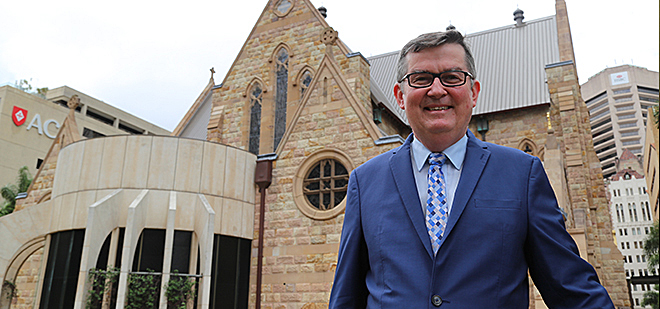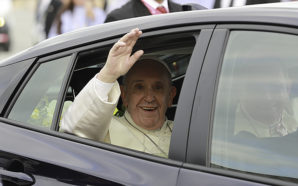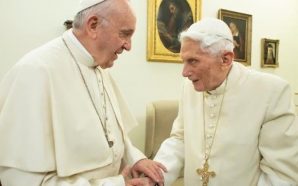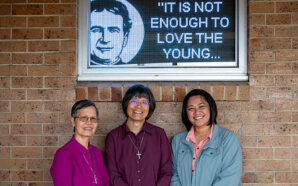Newly-appointed Brisbane archdiocese chancellor Pat Mullins says more lay people should step up to take on Church roles.
“It’s a good direction that the Church is going in, I think. It’s the way of the future,” he said.
Uniquely qualified for the role of chancellor, Mr Mullins is believed to be Australia’s only canon lawyer simultaneously practising as a common lawyer.
He becomes the first layman to hold the position in Brisbane, succeeding Fr Adrian Farrelly, chancellor for the past 10 years.
As the Catholic Church in Australia moves towards the Plenary Council 2020, Mr Mullins said it was clear that lay people had a growing part to play in the operation of the Church and its mission.
“Certainly the canon law provides that a lay person can have the office of chancellor,” he said.
“It really plays into the spirit of the Second Vatican Council – the Decree on the Apostolate of the Laity – that lay people do have a part in the life of the Church and they certainly should do things that they are fit to do and qualified to do.
“The numbers within the clergy are limited. They have to fulfil their pastoral roles in the parishes and so there are other roles in the administration of the Church that lay people can do and should do because we have to save the priests for their specific role in pastoral work.”
Well into his fourth decade of legal practice, Mr Mullins has a rich Church association.
He regularly advises Church and religious organisations on the day-to-day operation of schools and charities; and helps manage issues around legislative compliance and risk.
As chancellor he will be the chief record-keeper within the Brisbane archdiocese, will witness the decrees of Brisbane Archbishop Mark Coleridge under canon law, and will manage the maintenance of records in the curial offices.
Mr Mullins sees challenges ahead in implementing the recommendations of the Royal Commission into child sexual abuse, and believes in the importance of legally binding protection of religious freedoms.
“I think it’s been a bit sad that the release of the Ruddock report (of a review of protection of religious freedoms) was held up for so long,” he said.
“I think it’s quite important we have statutory protection of religious freedoms in place. It’s as important for the Catholic Church as it is to all the other denominations.
“For instance, the way our schools are run has to be sensitive to all sorts of things.
“I think our schools reflect respect for everybody. We don’t just have Catholic students at our schools and therefore we have to show respect for the various traditions from which those children come.”
Mr Mullins said it was right to insist that within Catholic schools people with “Catholic belief and who are giving good examples as Catholics” be appointed to key roles, such as principal or teacher of religious education.
“I think that’s a reasonable accommodation that Commonwealth and state legislation should afford us,” he said. “But we wouldn’t seek laws to allow us to discriminate against any of our students.
“Vatican II committed the Church to the defence of human rights and to respect for the dignity of all.”
Mr Mullins has experience working with different Christian churches and ecclesial communities in Australia, as well as the Church’s largest religious orders and Church bodies.
In 2017, he appeared before a state parliamentary committee to explain the seal of confession in the Catholic Church.
“It was an interesting conversation. What I think I was able to do was clear up a lot of misapprehensions by people who are not Catholic about the Sacrament of Penance,” Mr Mullins said.
“The priest is really acting in the role as a representative of Christ, and so I think it is an important sacrament for us Catholics. It still plays an essential part in the life of the Church.
“The important thing, I think, about the seal of confession is to remember what is caught by the seal and that is the confession of sin.
“In my view it is very clear that if during a sacramental confession a survivor makes a disclosure that they have been sexually abused, then that person is not talking about their own sin and therefore it’s not caught by the seal of confession.
“So if there was a child who talked about having been abused in their own family or in a school setting or by a priest, then that’s not caught by the seal and I would expect the priest (hearing the confession) to take steps to assist the person outside the confessional.”
With thanks to The Catholic Leader and Mark Bowling, where this article originally appeared.








